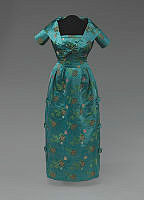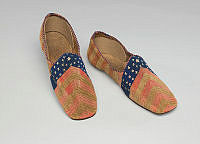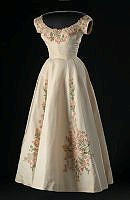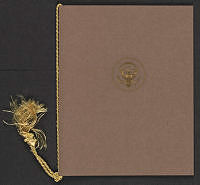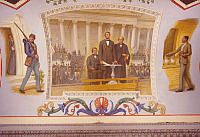Rubenstein Center Scholarship
John Mercer Langston
A Civil Rights Activist
In 2021, the Arlington County Board voted to change the name of Lee Highway, named after Confederate General Robert E. Lee, to Langston Boulevard in honor of John Mercer Langston, the first Black congressman from Virginia.1 Langston’s work as a civil rights activist led to several federal appointments by United States presidents and multiple White House visits. John M. Langston’s advocacy for the advancement of African Americans before and after the Civil War left both a legacy and blueprint for future civil rights leaders to follow.
Langston was born free on a plantation in Louisa County, Virginia, on December 14, 1829. He was the son of a formerly-enslaved woman, Lucy Langston, and Captain Ralph Quarles, her former enslaver. Lucy Langston was emancipated by Quarles in 1806 and they lived on the plantation together until 1834.2 After his parents’ deaths, John Langston was sent to Chillicothe, Ohio, per his father’s wishes and was raised by Colonel William D. Gooch, a close friend of Captain Quarles. Langston went on to attend Oberlin College, one of the first colleges to admit African Americans, and studied law following his graduation.3 At the age of twenty-four, Langston became the first African American to pass the Bar in Ohio on September 13, 1854.4

Congressman John M. Langston
Library of CongressAs a lawyer, he dedicated himself to the pursuit of liberty and justice for all. Langston spoke at the twenty-second anniversary of the American Anti-Slavery Society Convention held at the Metropolitan Theater in New York City on May 9, 1855. Prominent abolitionists such as Henry Ward Beecher, Henry Highland Garnett, and President of the American Anti-Slavery Society William Lloyd Garrison attended the event. Langston proclaimed:
There is not within the length and breadth of this entire country, from Maine to Georgia, from the Atlantic to the Pacific Ocean, a solitary man or woman who is in the possession of his or her full share of civil, religious and political liberty … We have been in the habit of boasting of our Declaration of Independence, of our Federal Constitution, of the Ordinance of 1787 … and yet I am forced to declare, looking the truth directly in the face and seeing the power of American slavery, that there is not within the bosom of this entire country, a solitary man or woman who can say “I have my full share of liberty.”5
This marked the beginning of his public activism for the advancement of African Americans.
Langston continued to practice law in Ohio until the outbreak of the Civil War. After Massachusetts Governor John Andrew began recruiting for the 54th Massachusetts Volunteer Infantry Regiment, one of the first U.S. military regiments to include African-American soldiers, Langston helped recruit African-American men from Ohio, Illinois, and Indiana for the Union cause.6
During his time recruiting African Americans for the war, Langston became one of the founding members of the National Equal Rights League (NERL) in 1864 with minister Henry Highland Garnet, abolitionist Frederick Douglass, and other civil rights activists. NERL was one of the earliest organizations dedicated to civil rights, and Langston was elected as its first president. The organization called for full and immediate citizenship for African Americans based on the sacrifices they made on the battlefield during the Civil War.7 They also believed that African-American men deserved the right to vote. After founding the national organization, state branches developed in Pennsylvania, North Carolina, Louisiana, Ohio, Missouri, Michigan, and Massachusetts. Langston also advocated for the NERL’s platform, bringing it specifically to the president of the United States.

Langston worked with abolitionist Frederick Douglass to create the NERL.
National ArchivesIn early April 1865, Langston set out to meet with President Abraham Lincoln and Secretary of War Edwin Stanton. In his words, Langston wanted to discuss “that the time had arrived, in view of the intelligence, experience, loyalty and service of the colored troops, for the commission of a colored man to colonelcy in the national service, with authority to recruit his own regiment and to officer it with colored men taken from regiments already in the service.”8 Langston, alongside the founding members of NERL, believed that the service and courage African Americans displayed on battlefields should translate to greater social and political rights.
Langston did not get the chance to meet with President Lincoln because of his assassination on April 15, 1865, though his fellow NERL founder Frederick Douglass developed a relationship with President Lincoln through several White House visits. Instead, Langston met with President Andrew Johnson a week after President Lincoln’s death. As president of NERL, he led a delegation of members in a meeting with President Johnson at the Treasury Building. President Johnson had not yet moved into the White House. Langston informed President Johnson that:
The colored American asks but two things. He asks, after providing his devotion to his country by responding to her call in the hour of her sorest trial, and after demonstrating, upon many hotly-contested battle-fields, his manhood and valor, that he have, first complete emancipation and secondly, full equality before American law.9
President Johnson responded:
I need not state to you my past history … In in you will find the guarantee of my future conduct toward your people. Where the colored people know me best they have confidence in me. I fear that leading colored men do not understand and appreciate the fact that they have friends on the south side of the line.10

The White House during the 1860s
White House Collection/White House Historical AssociationAlthough President Johnson reassured the delegation of his support, his actions as president suggested otherwise. President Johnson frequently clashed with Congress on Reconstruction policies. His decisions generally favored southern states that had seceded under the Confederacy. Despite President Johnson’s lack of support, Langston continued to fight for the overall advancement of African Americans. In 1867, General Oliver Otis Howard, Commissioner of the Freedmen’s Bureau and founder of Howard University, called upon Langston to serve as the Inspector General of the Freedmen’s Bureau. Created in 1865, the Freedmen’s Bureau provided food, clothing, and shelter for displaced Southerners including African Americans while helping to establish schools and supervise contracts between freedmen and employers.11 General Howard described the job as:
You will address yourself in all parts of the country to which you shall be sent, to arousing, inspiring and encouraging the freed people, especially in earnest and intelligent effort to cultivate and sustain among themselves, all those things which pertain to dignified, useful American life: to impress upon them the importance of educating themselves and their children … that while prejudices and feelings of hatred against them are allayed and removed, they may win the respect and gain the confidence even of those who formerly held them in bondage.12
Langston’s jurisdiction covered many southern states and regions, including Maryland, Kentucky, Tennessee, Missouri, and Washington, D.C. After a few months of work, President Johnson called Langston to the White House. President Johnson wanted to replace General Howard and appoint Langston as the new commissioner of the Freedmen’s Bureau. However, Langston declined, insisting that General Howard was the best person for the position.13 Langston spent the next two years advocating for the advancement of African Americans in the South, particularly stressing the importance of education.
Because of his experience in education, General Howard and the Board of Trustees selected Langston to become a law professor at Howard University. Howard University, a historically black college and university (HBCU) chartered by an act of Congress in 1867, was committed to graduate and professional education for African Americans.14 Langston accepted the position and developed the Howard University Law Department, which officially opened on January 6, 1869.15 Langston was later appointed as the dean of the law school in 1870. Langston’s respected work created a positive reputation, leading to a series of presidential appointments.

Professor Langston
Library of CongressOn March 15, 1871, President Ulysses S. Grant appointed Langston as a member of the Board of Health for Washington, D.C. Langston was one of the first African Americans to serve in such a position within the United States government. Through his relationship with President Grant, Langston recommended several people for prominent positions. He recommended George B. Vashon as judge of the police court in Washington, D.C.16 Vashon was New York’s first African-American lawyer and was admitted to Bar of the United States Supreme Court in 1867.17
In 1877, President Rutherford B. Hayes appointed Langston as the United States Minister to Haiti. Langston was the second African American to hold the position after Ebenezer D. Bassett. Langston remained minister until 1885 during the presidencies of James Garfield and Chester Arthur.
In 1888, Langston decided to run for Congress as a Republican representative for Virginia. He was specifically urged by African Americans to represent the “Black Belt of Virginia” as the region’s population was 65% African American.18 Langston’s campaign for election was an uphill battle from beginning to end. Langston ran as an Independent Republican because he did not have support from the National Republican Executive Committee. Langston lost the election by six-hundred and forty-one votes to Democratic candidate Edward Venable. However, Langston later challenged the vote, calling it a manipulated and unfair election.19 After an eighteen-month legal battle, on September 23, 1890, the House of Representatives voted in favor of Langston, allowing him to serve the remaining seven months of the term. While a member of Congress, Langston advocated for greater protection of African-American voting rights, a national industrial university to teach African Americans labor skills, and the appointment of Black candidates to the U.S. Military Academy at West Point and the U.S. Naval Academy at Annapolis.20 Unfortunately, his efforts did not gain traction in Congress and he lost his bid for election in 1890.
After serving in Congress, Langston remained vocal about the advancement of African Americans. He dedicated a large portion of his time writing his autobiography From the Virginia Plantation to the National Capital, which was published in 1894. Langston lived for another three years, passing away at the age of sixty-eight on November 15, 1897, in his home in Washington, D.C.
John Mercer Langston played an important role in shaping African-American life following the Civil War. He advocated for African-American citizenship and equality under the law. He believed that education was essential and encouraged African Americans in the South to seek learning opportunities. Langston helped to develop one of the first law schools in the United States to admit African Americans, Howard University School of Law. He gained the trust of several presidents, leading to federal appointments based on his abilities. Most importantly, Langston was the founder and president of the National Equal Rights League, one of the first civil rights organizations in America. He brought their platform advocating for full citizenship for African Americans directly to President Johnson. The National Equal Rights League remained a prominent organization until the rise of the National Association for the Advancement of Colored People (NAACP), which followed in Langston’s footsteps, as well as other civil rights activists of the time, to help obtain and secure rights for African Americans in the twentieth century.








